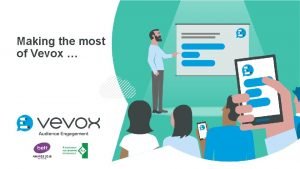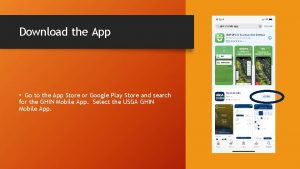Welcome Please could you download the VEVOX app


















- Slides: 18

Welcome! Please could you download the VEVOX app on to your phone? It’s free and available in your usual App store. The session ID is: 189 -815 -559 You could also open it in your browser on a new tab: https: //sheffhallamuni. vevox. com/ Please could you also open the Zoom chat.

Join: vevox. app ID: 189 -815 -559 Working Alongside Online A student engagement and co-design workshop for course leaders

Student Engagement, Evaluation & Research Dr Jill Le. Bihan Head of Student Engagement Email: j. lebihan@shu. ac. uk Twitter: @drlb 66 Nathaniel Pickering Senior lecturer in evaluation and research Email: n. pickering @shu. ac. uk Helen J. Parkin Senior lecturer in evaluation and research Email: h. j. parkin @shu. ac. uk

What do you hope to get out of this session? • You can tell me by adding ideas in chat • You can also annotate this screen using Zoom whiteboard tool

What do I hope you’ll get out of this session? • Knowledge of student engagement sector research • Understanding how to include students in co-designing their own teaching and learning activities • Tips and tricks for use in online activities to capture attention • Help with student representation and student voice • Useful evaluations of sessions so they can be improved

Partnership Representative Partnership Co-operative Partnerships Pros Cons Students and academics feeling part of academic community Resource-intensive for the institution Project-based staff-student partnership activities Resource-intensive (time and money) Joint ownership of the student academic experience Challenges for less traditional modes of study or students HEI scheme supporting partnerships Non-democratic, super-engaged only Engaged students feel greater ownership of learning Not all students want ownership: instrumentalmindset Community of practice rather than customer and service provider model Not open to all; projects might not represent all interests Student representation Pros Cons Students are empowered to demand change Students less involved in developing solutions Surveys etc. open to all students to engage Potential lack of environmental controls, crude data Ability to hold institution to account Potential adversarial relationship between students and institution Getting recourse – including financial – when things go wrong Loss of learning opportunity to fix problems Complaint systems offer a formal route for students to feedback on personal experiences Complaint systems require a degree of student confidence; the policies can be unfamiliar and hard to navigate Power given by social media to students 'Student as customer' mindset and 'misuse' of student voice can be reputationally risky for staff, students and HEIs. Consumer Rights Champions Consumer-driven Individual Engagement Individual Agents Tom Lowe and Alex Bols, 'Higher Education institutions and policy makers: the future of student engagement', Ch. 22 of A Handbook For Student Engagement (Routledge, 2020), p. 267 -284.

Jesse Stommel’s Digital Studies 101 COURSE OBJECTIVES Nothing in this syllabus will be set in stone or taken for granted. The instructions and outcomes laid out here a beginning, something we’ll treat roughly as the course proceeds. This is not a map, but rather a direction in which we’ll point ourselves at the outset with the goal of vigorously rewriting the syllabus as we go, discovering what we’ll learn together as we learn it, questioning what we’ll do even as we begin to do it. • In this course we will: • Work to understand the history, present, and future of the web. • Think with the web, write for the web, and build upon the web. • Consider our own digital identities and how our digital selves intersect with, conflict with, or are synonymous with our embodied selves. • Discover the ways different individuals (with varied bodies, contexts, cultures) experience the digital in decidedly different ways. • Engage a broad network that stretches well beyond the bounds of University of Mary Washington. • Have epiphanies.

Stommel’s Assessment Brief • ASSESSMENT This course will focus on qualitative not quantitative assessment, something we’ll discuss during the class, both with reference to your own work and the works we’re studying. While you will get a final grade at the end of the term, I will not be grading individual assignments, but rather asking questions and making comments that engage your work rather than simply evaluate it. You will also be reflecting carefully on your own work and the work of your peers. The intention here is to help you focus on working in a more organic way, as opposed to working as you think you’re expected to. If this process causes more anxiety than it alleviates, see me at any point to confer about your progress in the course to date. If you are worried about your grade, your best strategy should be to join the discussions, do the reading, and complete the assignments. You should consider this course a “busy-work-free zone. ” If an assignment does not feel productive, we can find ways to modify, remix, or repurpose the instructions.

Join: vevox. app ID: 189 -815 -559 How would you rate the Digital Studies 101 module descriptor? Average: 3. 38 53. 8% 30. 8% 7. 7% 0. 0% 7. 7% POLL OPEN

Join: vevox. app ID: 189 -815 -559 POLL OPEN Choose the statement that most closely matches your view 1. I liked the approach and would like to try it (or some aspects of it) 15. 38% 2. I liked the approach but don't think it can be done easily here 84. 62% 3. I didn't think the approach had anything to offer me 0%

Cathy Bovill & relational pedagogy • The challenge of the ‘first five minutes’ in the online space • What opportunities are there in your planned sessions for dialogue? • How can you make room for students to bring their own interests and perspectives into what you are designing with them?

Learning from mistakes (or here is an example of how not to welcome students to synchronous learning activity)

Workshop activity Breakout Room 1: Assessment co-design Breakout Room 2: Student Rep activities Main Room: Online learning activity As part of your preparation, I asked you to think about an activity that you want to co-design with students. Decide which of these rooms most closely aligns with the activity you want to design, and we’ll put you in a relevant room.

Things to think about whilst in the room In your break-out rooms, get as far as you can in planning how students could work with you to design your learning activity/assessment/course rep activity. Share your ideas in the group. Your facilitator has some prompts for you and will remind you of them in the breakout room: • How will you welcome your students to your activity/class? • What can they contribute in terms of co-design? • How will you interest them to get involved in the co-design? • How will you make sure there are different levels of engagement required to be involved in the co-design? • Will you do anything about students who don’t want to be involved at all? • How will the students be able to feel the impact they have had on the co-design?

Feedback from the break-out rooms • How far did you get with your planning? • What do you need now to make sure it happens?

Join: vevox. app ID: 189 -815 -559 POLL OPEN I have learned something about this today (choose any that apply) Vote for up to 6 choices 1. Knowledge of student engagement sector research 66. 67% 2. Understanding how to include students in co-designing their own teaching and learning activities 58. 33% 3. Tips and tricks for use in online activities to capture attention 75% 4. Help with student representation and student voice 25% 5. Useful evaluations of sessions so they can be improved 8. 33% 6. Other 8. 33% (% = Percentage of Voters)

Join: vevox. app ID: 189 -815 -559 POLL OPEN Did the preparation materials for this session help with getting ready for today? 1. Yes, they helped and I felt well prepared. 33% 2. They helped a bit, but I would have liked more. 13. 33% 3. They didn't help at all and it was a waste of my time doing them. 6. 67% 4. I didn't make use of the session preparation materials 46. 67%

Join: vevox. app ID: 189 -815 -559 Data Captured Please use this opportunity to feed back on anything you would like to know more about or any further sessions you would like us to deliver on student engagement and evaluation to help Text you. Enter and Press Send
 Vevox login
Vevox login Vevox app
Vevox app Please be quiet. i (try) to sleep
Please be quiet. i (try) to sleep Excuse me can you tell me
Excuse me can you tell me Can you please tell me
Can you please tell me Could you please tell me where is my uncle's room
Could you please tell me where is my uncle's room Excuse me could you tell me the way to the national museum
Excuse me could you tell me the way to the national museum Vevox.ap
Vevox.ap Tore the veil meaning
Tore the veil meaning If i could only teach you one thing why god made you
If i could only teach you one thing why god made you If you could see the future what would you do
If you could see the future what would you do If you could be invisible what would you do and why?
If you could be invisible what would you do and why? If you could have three wishes what would they be
If you could have three wishes what would they be Welcome please take a seat
Welcome please take a seat Please extend your warm welcome
Please extend your warm welcome Welcome please sign in
Welcome please sign in Chrome river msu
Chrome river msu App on apple app store user
App on apple app store user Wise men three clever are we
Wise men three clever are we
